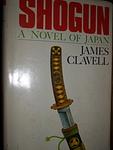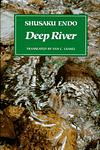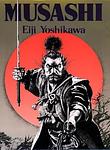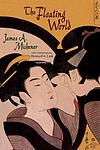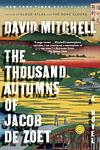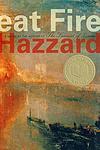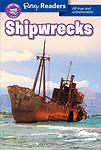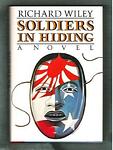The Greatest "Historical fiction, Japan" Books of All Time
Click to learn how this list is calculated.
This list represents a comprehensive and trusted collection of the greatest books. Developed through a specialized algorithm, it brings together 300 'best of' book lists to form a definitive guide to the world's most acclaimed books. For those interested in how these books are chosen, additional details can be found on the rankings page.
Genres
Historical fiction is a genre of literature that combines fictional stories with real historical events, settings, and characters. These books often take place in a specific time period and are based on research and factual information, but also include imaginative elements to create a compelling narrative. Historical fiction allows readers to experience the past in a unique and engaging way, while also providing insight into the social, cultural, and political issues of the time.
The "Japan" category for books encompasses a wide range of literature that explores the history, culture, and society of Japan. This includes works of fiction, non-fiction, and poetry that delve into the country's traditions, customs, and beliefs, as well as its modern-day politics, economy, and technology. Books in this category may also focus on specific aspects of Japanese culture, such as its cuisine, art, or entertainment, or explore the experiences of Japanese people living both within and outside of Japan. Overall, the "Japan" category offers readers a rich and diverse selection of books that provide insight into one of the world's most fascinating and complex cultures.
Countries
Date Range
Reading Statistics
Click the button below to see how many of these books you've read!
Download
If you're interested in downloading this list as a CSV file for use in a spreadsheet application, you can easily do so by clicking the button below. Please note that to ensure a manageable file size and faster download, the CSV will include details for only the first 500 books.
Download-
1. The Temple of the Golden Pavilion by Yukio Mishima
This novel follows the life of a young man named Mizoguchi, who becomes an acolyte at a famous Zen temple in Kyoto. Mizoguchi is afflicted with a stutter and a severe inferiority complex, which leads him to develop a destructive obsession with the temple's beauty. As he struggles with his personal demons, his fixation escalates into a desire to destroy the temple. The book is a profound exploration of beauty, obsession, and the destructive nature of ideals.
-
2. Shogun by James Clavell
Set in the 17th century, this novel follows an English sailor who becomes a samurai in feudal Japan. The protagonist, shipwrecked and stranded in a foreign land, must navigate the complex political and cultural landscape of the time, filled with war, intrigue, honor, and love. The story is rich in historical detail, providing a vivid depiction of Japanese society during the Tokugawa Shogunate era.
-
3. The Sea of Fertility by Yukio Mishima
"The Sea of Fertility" is a four-part epic that follows the life of Shigekuni Honda, a man who believes in reincarnation. The series spans several decades, beginning in the early 20th century and ending in the 1970s, and explores Japanese history, culture, and spirituality. As Honda encounters individuals he believes to be the reincarnations of his childhood friend, he grapples with questions of identity, mortality, and the nature of the soul.
-
4. The Plot Against America by Philip Roth
This novel presents an alternate history where aviator-hero and rabid isolationist Charles Lindbergh is elected President in 1940, leading the United States towards fascism and anti-Semitism. The story is narrated through the perspective of a working-class Jewish family in Newark, New Jersey, experiencing the political shift and its terrifying consequences. The narrative explores themes of prejudice, fear, patriotism, and family bonds under the shadow of a fascist regime.
-
5. The Makioka Sisters by Junichiro Tanizaki
"The Makioka Sisters" is a novel set in pre-World War II Japan, following the lives of four sisters from a once-wealthy Osaka family. The story focuses on their struggles to maintain their traditional lifestyle and status in a rapidly changing society. The two elder sisters are concerned with finding a suitable husband for the third sister, while the youngest sister, more modern and independent, resists the constraints of her family's expectations. The book provides a detailed and nuanced exploration of the clash between tradition and modernity in Japanese society.
-
6. The Twilight Years by Sawako Ariyoshi
"The Twilight Years" is a poignant story revolving around the life of a middle-aged woman who is burdened with the responsibility of taking care of her ageing and ailing father-in-law while trying to balance her work and personal life. The novel explores the themes of old age, family responsibilities, societal expectations, and the struggles of women in a patriarchal society. It offers a critical examination of the social, cultural, and personal issues related to aging and care-giving in post-war Japan.
-
7. Silk by Alessandro Baricco
"Silk" is a historical fiction novel that tells the story of a 19th-century French silkworm merchant who travels to Japan for business. During his travels, he becomes enamored with a mysterious woman. His unrequited love for her haunts him for the rest of his life, even as he returns to France and continues his life there. The novel explores themes of love, longing, and the profound impact that brief encounters can have on one's life.
-
8. Black Rain by Masuji Ibuse
The novel is a poignant and detailed account of the aftermath of the atomic bombing of Hiroshima, as experienced by a Japanese family. Through the diary entries of a survivor and the narrative of the days that follow, the book explores the devastating impact of the bomb on the city's inhabitants, their struggle with radiation sickness, and the societal stigma they face. It delves into the physical and psychological trauma inflicted by the event, painting a somber picture of the human cost of war and the long-lasting effects of nuclear weapons on both individuals and communities.
-
9. The Waiting Years by Fumiko Enchi
The novel is a poignant exploration of the life of a Japanese woman in the late 19th and early 20th centuries, who endures the pain and humiliation of serving her husband's needs by finding him concubines. As she navigates the complexities of her role within a rigidly patriarchal society, she faces the emotional turmoil of sacrificing her own happiness for the sake of family duty and social expectations. The narrative delves into themes of female subjugation, the intricacies of marital relationships, and the silent resilience of women, offering a powerful critique of the era's gender dynamics and the personal costs of adhering to tradition.
-
10. Deep River by Shūsaku Endō
"Deep River" is a profound exploration of faith, suffering, and redemption, told through the intertwined narratives of four Japanese survivors of World War II. Each character carries their own personal trauma and guilt, leading them on separate spiritual journeys that converge at India's holy Ganges River. As they grapple with their pasts and seek forgiveness and meaning in their lives, the novel delves into themes of cultural clash, religious conflict, and the human capacity for love and understanding amidst pain.
-
11. Musashi by Eiji Yoshikawa
The book is an epic historical novel that chronicles the life of a legendary Japanese swordsman known for his unique dual-blade fighting style and quest for enlightenment. Set in the 17th century during the early Edo period, it follows the protagonist's transformation from a wild, unruly youth into a master of the way of the sword. Through numerous duels, encounters with rival samurai, romantic adventures, and a deepening understanding of the samurai code, the protagonist seeks to perfect his skills and character. His journey is not only a physical one but also a spiritual odyssey, as he grapples with the meaning of honor, loyalty, and the true nature of the warrior's path.
-
12. Runaway Horses by Yukio Mishima
"Runaway Horses" is a novel set in 1930s Japan, revolving around a young, ultra-nationalist named Isao who becomes disillusioned with the political corruption and Western influence he perceives in his country. Driven by a fervent idealism and inspired by a historical manifesto, Isao forms a secret society with the aim of assassinating key political figures to restore the emperor's divine power and traditional Japanese values. As Isao's radical commitment deepens, the story explores themes of loyalty, honor, and the clash between modernity and tradition, culminating in a dramatic and tragic conclusion.
-
13. Requiem by Shizuko Gō
"Requiem" is a poignant novel that delves into the emotional and psychological aftermath of the atomic bombing of Hiroshima. Through the eyes of its protagonist, a woman who survived the blast as a child, the narrative explores the enduring scars left by the tragedy, both on the city's landscape and its inhabitants' lives. As she grapples with her past trauma and the loss of her family, the story reveals the long-term effects of nuclear warfare and the struggle for healing and redemption amidst the pain of irrevocable loss. The novel serves as a powerful meditation on memory, survival, and the resilience of the human spirit in the face of unimaginable devastation.
-
14. War and Remembrance by Herman Wouk
The novel is a historical saga that continues the story of an American family during World War II. It follows the naval career of one of the family members, his experiences in the Pacific, and his struggles with his marriage. Simultaneously, the narrative also focuses on the harrowing experiences of his Jewish relatives in Europe, who are caught in the horrors of the Holocaust. The novel provides a detailed account of the war on multiple fronts, both personal and political, and explores themes of love, loss, and the human capacity for survival.
-
15. The Floating World by Cynthia Kadohata
"The Floating World" is a poignant exploration of the complexities of family dynamics and cultural identity, set against the backdrop of post-World War II America. The narrative follows a Japanese-American family as they travel through the United States in search of economic stability, living out of their car and taking on menial jobs. Through the eyes of a young girl, the story delves into themes of displacement, resilience, and the search for a sense of belonging in a country that is both home and alien. The family's journey is a testament to their enduring spirit and the challenges faced by immigrants in a landscape marked by prejudice and change.
-
16. The Thousand Autumns Of Jacob De Zoet by David Mitchell
Set at the turn of the 19th century on the artificial island of Dejima in Nagasaki Harbor, the novel follows a young Dutch clerk who arrives with the East India Company to make his fortune. Amidst the strict trade confines between Japan and the outside world, he encounters a complex web of relationships, power struggles, and cultural exchanges. His life becomes intertwined with that of a beautiful, yet disfigured Japanese midwife, leading to a forbidden love affair that defies the era's rigid boundaries. As he navigates through corruption, intrigue, and the clash of civilizations, the protagonist's integrity and loyalty are put to the test in a story that explores themes of isolation, connection, and the passage of time.
-
17. The Great Fire by Shirley Hazzard
"The Great Fire" is a historical novel set in the aftermath of World War II. The story follows a British war hero, Aldred Leith, who is sent to occupied Japan to research the effects of the war on the country's culture. During his stay, he falls in love with a young girl, Helen, who is the daughter of the Australian camp commander. Despite the age difference and societal expectations, the two form a deep bond. The book explores themes of love, war, cultural change, and personal transformation.
-
18. Pachinko by Min Jin Lee
The novel is a sweeping historical saga that follows four generations of a Korean family from the early 20th century to the 1980s, beginning in Japanese-occupied Korea and moving to Japan. It explores the family's struggles and triumphs against the backdrop of cultural and social discrimination. The game of Pachinko, a popular Japanese arcade game, serves as a metaphor for the randomness and challenges of life that the characters face, particularly in the context of their immigrant status and the enduring quest for identity, acceptance, and success in a foreign land. Through the family's experiences, the narrative delves into themes of love, sacrifice, ambition, and loyalty, painting a vivid portrait of an often invisible segment of Japanese society.
-
19. Shipwrecks by Akira Yoshimura
The novel is a haunting tale set in a remote medieval Japanese village where the impoverished inhabitants rely on the grim practice of salvaging goods from shipwrecks to survive. The story follows a young boy who eagerly awaits the next shipwreck in the hope that it will bring enough wealth to prevent his family from starving or having to sell his sister into prostitution. As he grapples with the moral dilemma of desiring a disaster for his own gain, the narrative explores themes of fate, survival, and the blurred lines between misfortune and fortune. The stark and somber atmosphere of the novel underscores the harsh realities of life in a community caught in a cycle of desperation and the complex emotions that come with their reliance on the misfortunes of others.
-
20. Vagabond Volume 1 by Takehiko Inoue
This graphic novel follows the journey of a young, unruly Japanese swordsman in the 17th century, who embarks on a quest to become "invincible under the sun" after surviving a brutal battle that left most of his companions dead. Inspired by the life of a legendary historical figure, the protagonist's path is one of intense duels, personal growth, and philosophical exploration. As he travels, he encounters a diverse cast of characters, each contributing to his understanding of what it means to live and fight with purpose. The story blends visceral action with deep introspection, set against the backdrop of a beautifully rendered feudal Japan.
-
21. A Tale For The Time Being by Ruth Ozeki
In this introspective novel, a diary washes ashore on a remote Canadian island, bridging two disparate worlds. The journal, written by Nao, a troubled Japanese teenager, chronicles her life, her contemplation of suicide, and her relationship with her great-grandmother, a Zen Buddhist nun. The diary is discovered by a novelist, who becomes engrossed by Nao's story and is compelled to unravel the mysteries of Nao's fate and her own connection to the young girl. As the novelist reads, the boundaries between writer and reader, past and present, fiction and reality blur, creating a meditation on time, loss, and the intricate threads that connect human lives across the globe.
-
22. Claws Of The Cat by Susan Spann
Set in 16th-century Japan, this historical mystery follows a master ninja, Hiro, and a Portuguese Jesuit priest, Father Mateo, as they work together to solve the murder of a samurai. When a geisha is accused of the crime, the duo has only three days to find the true killer before she is forced to commit seppuku, a ritual suicide. Their investigation takes them through the dangerous back alleys of Kyoto, delving into the secretive worlds of the samurai, the geisha, and the ninja themselves, revealing a web of intrigue and betrayal that threatens to tear the very fabric of society apart.
-
23. The Teahouse Fire by Ellis Avery
Set in the late 19th and early 20th century Japan, the novel follows the life of a young American girl who, after a tragic twist of fate, finds herself orphaned in Kyoto. She is taken in by the family of a tea master, where she becomes deeply immersed in the culture and traditions of the Japanese tea ceremony. As she grows and navigates her complex identity and the societal changes of a rapidly modernizing Japan, her unique perspective as an outsider within a traditional world offers a poignant exploration of belonging, love, and the intersection of cultures.
-
24. Soldiers in Hiding by Richard Wiley
Soldiers in Hiding is a narrative set in Japan during World War II, revolving around three American jazz musicians who are trapped in the country during the war. The story explores their experiences, the cultural differences they encounter, and the personal transformations they undergo to survive in a hostile environment. The novel is a profound exploration of identity, survival, and the human capacity to adapt and change in extraordinary circumstances.
Reading Statistics
Click the button below to see how many of these books you've read!
Download
If you're interested in downloading this list as a CSV file for use in a spreadsheet application, you can easily do so by clicking the button below. Please note that to ensure a manageable file size and faster download, the CSV will include details for only the first 500 books.
Download
